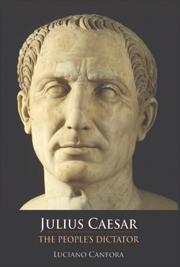Book contents
- Frontmatter
- Contents
- Translators' Note
- Acknowledgements
- Foreword
- PART I FROM SULLA TO CATILINE
- 1 In Flight from Sulla: First Experiences of an Aristocratic Youth
- 2 Prisoner of the Pirates (75–74 BC)
- 3 The Rise of a Party Leader
- 4 Pontifex Maximus
- 5 The ‘Affairs’ of Mr Julius Caesar and Others
- 6 The Political Market
- 7 Inside and Outside the Conspiracy
- 8 Caesar's Senate Speech Rewritten by Sallust
- PART II FROM THE TRIUMVIRATE TO THE CONQUEST OF GAUL
- PART III THE LONG CIVIL WAR
- PART IV FROM THE CONSPIRACY TO THE TRIUMPH OF CAESARISM
- Chronology
- Bibliography
- Index
2 - Prisoner of the Pirates (75–74 BC)
from PART I - FROM SULLA TO CATILINE
Published online by Cambridge University Press: 05 August 2013
- Frontmatter
- Contents
- Translators' Note
- Acknowledgements
- Foreword
- PART I FROM SULLA TO CATILINE
- 1 In Flight from Sulla: First Experiences of an Aristocratic Youth
- 2 Prisoner of the Pirates (75–74 BC)
- 3 The Rise of a Party Leader
- 4 Pontifex Maximus
- 5 The ‘Affairs’ of Mr Julius Caesar and Others
- 6 The Political Market
- 7 Inside and Outside the Conspiracy
- 8 Caesar's Senate Speech Rewritten by Sallust
- PART II FROM THE TRIUMVIRATE TO THE CONQUEST OF GAUL
- PART III THE LONG CIVIL WAR
- PART IV FROM THE CONSPIRACY TO THE TRIUMPH OF CAESARISM
- Chronology
- Bibliography
- Index
Summary
An unforeseen event marred the journey. Off the island of Pharmacussa – one of the Sporades to the south of Miletos – Caesar's ship was seized by pirates, the ferocious pirates of Cilicia. The most colourful account of this episode, which is also found in the historical writing of Velleius, is by Plutarch, and Suetonius too provides details which concur with the vivid account by his Greek contemporary. It is difficult to imagine that anybody but Caesar himself could be the source of the story. The sardonic self-confidence with which the whole episode is related must come from him. ‘The pirates demanded twenty talents for his ransom,’ says Plutarch, ‘and he laughed at them for not knowing who their captive was, and of his own accord agreed to give them fifty.’ He dispatched messengers from his entourage to collect the money, keeping only his personal doctor and two slaves at his side. Although a hostage for thirty-eight days while waiting for the messengers to return with the money, he quickly assumed a leading position. When it was time to sleep, he would send one of the two slaves to command silence. When his captors were practising their sports and exercises, he gave directions, as if he had assumed command with their consent. They even provided him with an audience. To make profitable use of the enforced idleness of captivity, he composed poetry and speeches, which he recited in the presence of his captors, expecting their admiration.
- Type
- Chapter
- Information
- Julius CaesarThe People's Dictator, pp. 9 - 13Publisher: Edinburgh University PressPrint publication year: 2007

